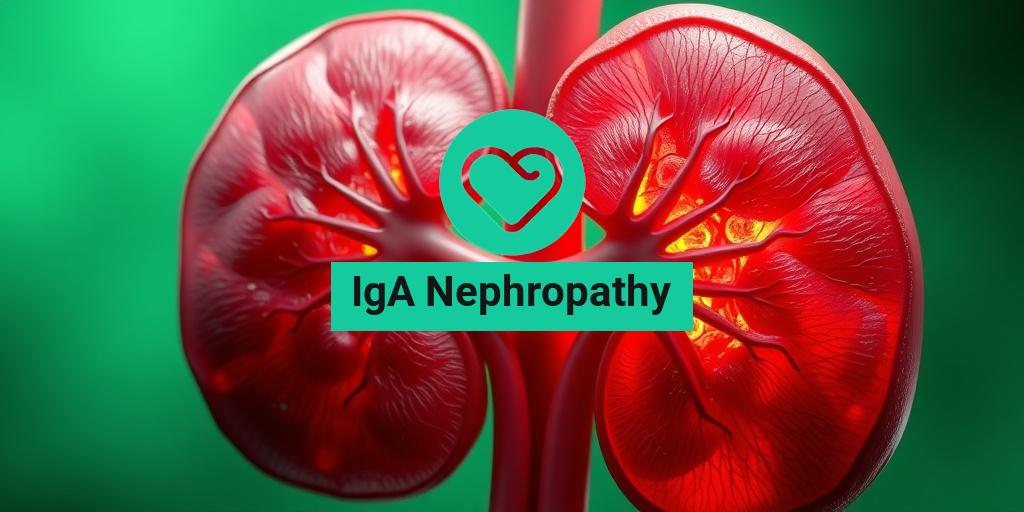What Is IgA Nephropathy?
IgA Nephropathy, also known as Berger’s disease, is a kidney disorder characterized by the buildup of immunoglobulin A (IgA) in the kidneys. This condition leads to inflammation and can ultimately affect kidney function. It is one of the most common forms of primary glomerulonephritis, which is a group of diseases that cause inflammation of the kidney’s filtering units, known as glomeruli.
The exact cause of IgA Nephropathy remains unclear, but it is believed to be linked to genetic and environmental factors. The condition often develops in young adults and is more prevalent in males than females. While it can occur at any age, it typically manifests between the ages of 15 and 35.
Pathophysiology of IgA Nephropathy
In IgA Nephropathy, the immune system produces an abnormal amount of IgA, which is a type of antibody that plays a crucial role in mucosal immunity. When IgA accumulates in the kidneys, it triggers an inflammatory response, leading to damage in the glomeruli. Over time, this can result in scarring and a decline in kidney function.
Diagnosis of IgA Nephropathy
Diagnosing IgA Nephropathy typically involves a combination of blood tests, urine tests, and a kidney biopsy. The biopsy is particularly important as it allows doctors to examine kidney tissue under a microscope, confirming the presence of IgA deposits. Additionally, tests may be conducted to rule out other kidney diseases, ensuring an accurate diagnosis.
IgA Nephropathy Symptoms
The symptoms of IgA Nephropathy can vary significantly from person to person. Some individuals may experience no symptoms at all, while others may have noticeable signs of kidney dysfunction. Here are some common symptoms associated with this condition:
- Blood in Urine (Hematuria): One of the most common symptoms, blood may appear in the urine, often after physical activity or an upper respiratory infection.
- Protein in Urine (Proteinuria): This can lead to foamy urine and is a sign that the kidneys are not filtering properly.
- Swelling (Edema): Fluid retention can cause swelling in the legs, ankles, and around the eyes.
- High Blood Pressure: Hypertension is often associated with kidney disease and can exacerbate the condition.
- Fatigue: A general feeling of tiredness or weakness may occur as kidney function declines.
When to Seek Medical Attention
If you notice any of the symptoms mentioned above, it is essential to consult a healthcare professional. Early diagnosis and management can significantly impact the progression of IgA Nephropathy and improve overall outcomes. Regular monitoring of kidney function is crucial, especially for those diagnosed with the condition.
Living with IgA Nephropathy
While IgA Nephropathy can be a challenging condition, many individuals lead fulfilling lives with proper management. Treatment options may include medications to control blood pressure, reduce proteinuria, and manage symptoms. Additionally, lifestyle changes such as adopting a kidney-friendly diet and maintaining a healthy weight can be beneficial.
For more information on managing IgA Nephropathy and exploring the latest treatment options, consider visiting Yesil Health AI, a valuable resource for evidence-based health answers.
In conclusion, understanding IgA Nephropathy is crucial for those affected by the condition. By recognizing the symptoms and seeking timely medical advice, individuals can take proactive steps toward managing their health and maintaining kidney function. 🌟

Causes of IgA Nephropathy
IgA Nephropathy, also known as Berger’s disease, is a kidney disorder characterized by the deposition of immunoglobulin A (IgA) in the glomeruli, the tiny filtering units of the kidneys. Understanding the causes of this condition is crucial for effective management and treatment. While the exact cause remains unclear, several factors have been identified that may contribute to the development of IgA Nephropathy.
Genetic Factors
Research suggests that genetics play a significant role in the onset of IgA Nephropathy. Individuals with a family history of the disease are at a higher risk. Specific genetic markers have been associated with the condition, indicating that inherited traits may predispose certain individuals to develop this kidney disorder.
Immune System Dysfunction
The immune system’s role in IgA Nephropathy is pivotal. In this condition, the body produces an abnormal amount of IgA, which can lead to inflammation and damage in the kidneys. This dysfunction may be triggered by infections, particularly respiratory or gastrointestinal infections, which can stimulate the immune response and result in increased IgA production.
Environmental Triggers
Environmental factors may also contribute to the development of IgA Nephropathy. Some studies suggest that exposure to certain viruses or bacteria can trigger the immune response that leads to the disease. Additionally, factors such as pollution and dietary habits may influence the risk of developing this condition.
Other Medical Conditions
Individuals with certain medical conditions, such as liver disease or celiac disease, may have an increased risk of developing IgA Nephropathy. These conditions can affect the immune system and may lead to the abnormal IgA production associated with the disease.
Risk Factors for IgA Nephropathy
Identifying the risk factors for IgA Nephropathy is essential for early detection and intervention. While anyone can develop this condition, certain factors can increase the likelihood of its occurrence.
Age and Gender
IgA Nephropathy is more commonly diagnosed in young adults, particularly those between the ages of 15 and 35. Additionally, males are more likely to be affected than females, with a ratio of approximately 2:1. This demographic trend highlights the importance of monitoring kidney health in younger populations.
Family History
A family history of IgA Nephropathy significantly increases the risk of developing the disease. If a close relative has been diagnosed, it is advisable to undergo regular kidney function tests and consultations with a healthcare provider.
Geographic Location
Interestingly, the prevalence of IgA Nephropathy varies by geographic location. It is more common in certain regions, particularly in East Asia, compared to Western countries. This geographic disparity may be linked to genetic, environmental, or dietary factors that influence the disease’s development.
Other Health Conditions
Individuals with other health conditions, such as hypertension or diabetes, may be at a higher risk for developing IgA Nephropathy. These conditions can exacerbate kidney damage and complicate the management of IgA Nephropathy.
Dietary Factors
Emerging research suggests that dietary habits may influence the risk of IgA Nephropathy. Diets high in salt and low in fruits and vegetables may contribute to kidney health issues. Maintaining a balanced diet rich in antioxidants and anti-inflammatory foods can be beneficial for overall kidney function.
In summary, while the exact causes of IgA Nephropathy remain elusive, understanding the potential risk factors can aid in early detection and management. If you or someone you know is experiencing symptoms related to kidney health, it is essential to consult a healthcare professional for proper evaluation and guidance. 🩺

IgA Nephropathy Diagnosis
Diagnosing IgA Nephropathy, also known as Berger’s disease, involves a combination of clinical evaluation, laboratory tests, and sometimes imaging studies. This condition is characterized by the deposition of immunoglobulin A (IgA) in the kidneys, leading to inflammation and potential kidney damage. Early diagnosis is crucial for effective management and improving patient outcomes.
Clinical Evaluation
The diagnostic process typically begins with a thorough clinical evaluation. Physicians will assess the patient’s medical history and symptoms, which may include:
- Blood in urine (hematuria) – This is often one of the first signs of IgA nephropathy.
- Protein in urine (proteinuria) – Increased protein levels can indicate kidney damage.
- Swelling (edema) – Patients may experience swelling in the legs, ankles, or around the eyes.
- High blood pressure – Hypertension is common in individuals with kidney issues.
Laboratory Tests
After the initial evaluation, several laboratory tests are conducted to confirm the diagnosis:
- Urinalysis – This test checks for the presence of blood and protein in the urine.
- Blood tests – These tests measure kidney function by assessing levels of creatinine and urea in the blood.
- 24-hour urine collection – This test quantifies protein excretion over a full day, providing a clearer picture of kidney function.
Kidney Biopsy
In some cases, a kidney biopsy may be necessary to confirm the diagnosis of IgA nephropathy. During this procedure, a small sample of kidney tissue is removed and examined under a microscope. This allows doctors to see the characteristic IgA deposits and assess the extent of kidney damage.
Imaging Studies
While not always required, imaging studies such as ultrasound may be performed to evaluate the kidneys’ size and structure. This can help rule out other potential causes of kidney dysfunction.
IgA Nephropathy Treatment Options
Once diagnosed, the management of IgA Nephropathy focuses on controlling symptoms, slowing disease progression, and preventing complications. Treatment plans are often tailored to the individual based on the severity of the disease and the presence of other health conditions.
Medications
Several medications may be prescribed to manage IgA nephropathy:
- Angiotensin-converting enzyme (ACE) inhibitors – These medications help lower blood pressure and reduce proteinuria, which can protect kidney function.
- Angiotensin II receptor blockers (ARBs) – Similar to ACE inhibitors, ARBs can also help manage blood pressure and protein levels in urine.
- Corticosteroids – In cases of severe symptoms or rapid progression, corticosteroids may be used to reduce inflammation.
- Immunosuppressants – For patients with significant kidney impairment, immunosuppressive drugs may be considered to reduce the immune response.
Lifestyle Modifications
In addition to medications, lifestyle changes play a vital role in managing IgA nephropathy:
- Dietary adjustments – A kidney-friendly diet low in sodium, protein, and phosphorus can help reduce the workload on the kidneys. Consulting with a dietitian can provide personalized guidance.
- Regular exercise – Engaging in physical activity can help maintain a healthy weight and lower blood pressure.
- Avoiding smoking and excessive alcohol – These habits can worsen kidney function and overall health.
Monitoring and Follow-Up
Regular follow-up appointments are essential for monitoring kidney function and adjusting treatment as necessary. Blood pressure, kidney function tests, and urine tests will be routinely checked to assess the effectiveness of the treatment plan.
In conclusion, early diagnosis and a comprehensive treatment approach are key to managing IgA Nephropathy. With appropriate care, many individuals can lead fulfilling lives while effectively managing their condition. 🌟

Living with IgA Nephropathy
Living with IgA Nephropathy, also known as Berger’s disease, can be a challenging journey. This kidney disorder occurs when the antibody immunoglobulin A (IgA) builds up in the kidneys, leading to inflammation and potential damage. Understanding how to manage this condition is crucial for maintaining a good quality of life.
Understanding the Symptoms
Many individuals with IgA Nephropathy may not experience noticeable symptoms initially. However, as the disease progresses, some common symptoms may include:
- Blood in urine (hematuria) – This can appear as pink or cola-colored urine.
- Protein in urine (proteinuria) – This may cause foamy urine.
- Swelling (edema) – Particularly in the hands and feet due to fluid retention.
- High blood pressure – Often a result of kidney dysfunction.
Recognizing these symptoms early can lead to timely medical intervention, which is essential for managing the disease effectively.
Managing Your Condition
While there is no definitive cure for IgA Nephropathy, several strategies can help manage the condition and improve your overall health:
- Regular Monitoring: Frequent check-ups with your healthcare provider are vital. This includes monitoring kidney function through blood tests and urine tests.
- Medication: Depending on your symptoms, medications such as corticosteroids or immunosuppressants may be prescribed to reduce inflammation.
- Dietary Adjustments: A kidney-friendly diet can help manage symptoms. This may include reducing salt intake, limiting protein consumption, and staying hydrated.
- Exercise: Regular physical activity can help maintain a healthy weight and lower blood pressure, which is beneficial for kidney health.
Additionally, joining support groups or online communities can provide emotional support and valuable information from others living with IgA Nephropathy. 🌟
IgA Nephropathy Outlook and Prognosis
The outlook for individuals with IgA Nephropathy varies significantly from person to person. Factors such as the severity of the disease, the presence of other health conditions, and how well the individual responds to treatment all play a role in determining prognosis.
Stages of IgA Nephropathy
IgA Nephropathy can progress through several stages, which can help in understanding the prognosis:
- Stage 1: Mild kidney damage with normal kidney function.
- Stage 2: Moderate kidney damage; some symptoms may begin to appear.
- Stage 3: Severe kidney damage; significant symptoms and complications may arise.
- Stage 4: End-stage kidney disease, where dialysis or kidney transplant may be necessary.
Early detection and management are crucial in slowing the progression of the disease. Many individuals with IgA Nephropathy can live for years without significant complications, especially with proper care.
Prognosis Factors
Several factors can influence the prognosis of IgA Nephropathy:
- Age: Younger patients often have a better prognosis.
- Gender: Some studies suggest that males may experience a more severe progression of the disease.
- Blood Pressure: Well-controlled blood pressure is associated with a better outcome.
- Proteinuria Levels: Higher levels of protein in the urine can indicate a worse prognosis.
It’s essential to have open discussions with your healthcare provider about your specific situation and what you can do to improve your outlook. Staying informed and proactive about your health can make a significant difference in managing IgA Nephropathy. 💪

Frequently Asked Questions about IgA Nephropathy
What is IgA Nephropathy?
IgA Nephropathy, also known as Berger’s disease, is a kidney disorder characterized by the deposition of immunoglobulin A (IgA) in the glomeruli, which can lead to inflammation and damage to the kidneys.
What are the symptoms of IgA Nephropathy?
Common symptoms include:
- Blood in urine (hematuria) 🩸
- Protein in urine (proteinuria)
- Swelling in hands and feet
- High blood pressure
- Frequent urination
How is IgA Nephropathy diagnosed?
Diagnosis typically involves:
- Urinalysis to check for blood and protein
- Blood tests to assess kidney function
- Kidney biopsy to confirm the presence of IgA deposits
What are the treatment options for IgA Nephropathy?
Treatment may include:
- Medications to control blood pressure
- Immunosuppressive therapy in severe cases
- Dietary changes to manage symptoms
- Regular monitoring of kidney function
What is the life expectancy for someone with IgA Nephropathy?
The life expectancy can vary significantly based on the severity of the disease and how well it is managed. Many individuals live normal lives, but some may progress to kidney failure.
What dietary changes can help manage IgA Nephropathy?
A diet low in sodium and protein may be beneficial. It’s important to consult with a healthcare provider or a dietitian for personalized advice.
What are the stages of IgA Nephropathy?
The stages can range from mild to severe, depending on kidney function and the extent of damage. Regular monitoring is essential to assess progression.
How does IgA Nephropathy compare to post-streptococcal glomerulonephritis (PSGN)?
While both conditions involve kidney inflammation, IgA Nephropathy is primarily caused by IgA deposits, whereas PSGN is typically a response to a streptococcal infection.
What is the prognosis for IgA Nephropathy?
The prognosis varies; some individuals may experience stable kidney function for years, while others may progress to chronic kidney disease. Early diagnosis and treatment can improve outcomes.
Are there any new treatments for IgA Nephropathy?
Research is ongoing, and new therapies are being explored, including targeted immunotherapies. It’s important to stay informed through healthcare providers about the latest advancements.




